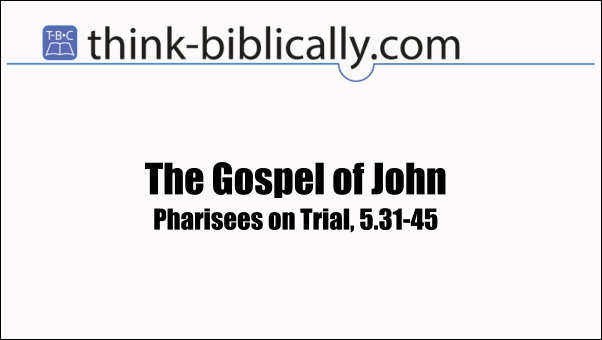By Tyson Thorne

After giving the Pharisees a theology lesson, he takes them to court. Not literally, of course, but he uses the language of a trial — "testimony" and "deeds" and "accuse" — to make the case that he is indeed the Messiah. The first line of today's passage, however, is both surprising and confusing. Jesus states, "If I testify about myself, my testimony is not true." What did Jesus mean and why is his word not enough? I think the answer is in the law, and the two courts in which a person can be judged.
Deuteronomy 19 contains laws pertaining to "witnesses" in a legal matter. Verse 15 states plainly, "A single witness may not testify against another person for any trespass or sin that he commits. A matter may be legally established only on the testimony of two or three witnesses."
For this reason, before the Pharisees in chapter four, Jesus does not offer to confess his divine status. Instead, he points to John the Baptist as his first witness, stating the caveat that John is human and therefore not acceptable in a divine court but is acceptable in a human one. He then identifies God the Father as his second witness, therefore establishing the required two witnesses before the Hebrew bench. In doing so, it appears that Jesus unnecessarily complicates matters by bringing up the heavenly court. We have already learned that at the Great White Throne judgment Jesus is the only judge of mankind. Surely his testimony should be enough for an earthy justice system? But Jesus is intent to fulfill the Law of Moses, not usurp it. Therefore, in every matter Jesus works within the Mosaic Law during his earthly ministry. Possibly by bringing up the Heavenly seat of judgment Jesus is reminding the religious leaders that they will one day sit in his court.
Jesus doesn't stop there. Having already brought up the future judgment he continues to tell them that, given their current state, that day will not go well for them. By rejecting Jesus they reject the God they claim to serve. The Pharisees study the Bible as an end to itself, rather than using it to build a proper connection with the Father. It is a path that is easy for scholars to follow, but it doesn't lead to life everlasting.
As evidence of their unrighteous state Jesus offers an example: they accept human testimony rather than Gods. The accept the testimony of praise from others, and they take the word of those who come without the signs, testimony and authority of God. They ought instead to seek accept the testimony of God above that of men and seek his praise alone.
Jesus's closing argument is a simple one. He argues that the very law they claim to serve and enforce condemns them, for Moses wrote about the Messiah to come and they have rejected him. It is the Pharisees who break the holy law, not Jesus.
Can you hear the smack of the gavel? Case closed.
